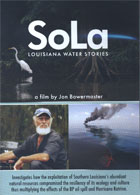
SoLa: Louisiana Water Stories 2010
Distributed by Bullfrog Films, PO Box 149, Oley, PA 19547; 800-543-FROG (3764)
Produced by Oceans 8 Productions
Directed by Jon Bowermaster
DVD, color, 62 min.
Sr. High - Adult
Area Studies, Biology, Ecology, Social Sciences
Date Entered: 04/22/2011
Reviewed by Jim Hobbs, Online Service Coordinator, Monroe Library, Loyola University, New Orleans, LALouisiana has been in the news for environmental disasters for decades. We've seen runaway erosion of the coastline, the Gulf of Mexico dead zone, loss of species diversity, and all well before the Corps of Engineers’ levee failures following Hurricane Katrina and the BP/Deepwater Horizon/Macondo deep water oil debacle. SoLa : Louisiana Water Stories attempts to cover these stories and more within an hour, focusing on the impact on humans and the environment. The format is a series of individual interviews with key figures interspersed with images of natural beauty and spoilage. Ground level and aerial views of lush, beautiful bayous and marshes give way to rusted, abandoned equipment, and everywhere, water. The background music is mostly by Roddie Romero and the Hub City All-Stars, ranging from Cajun to country blues. All create an alternatively appealing and appalling view of south Louisiana.
The initial interview is with Ivor van Heerden, former deputy director, Louisiana State University (LSU) Hurricane Center, about the loss of wetlands and vulnerability to hurricanes this creates along the Louisiana coast. He is one of two academic experts, with Paul Templet, former director Louisiana Department of Environmental Quality (during the 1980s, under Gov. Buddy Roemer) and retired LSU professor of environmental science. All other interviewees are common people who live on the land and marshes. There’s a grandmother and MacArthur Grant winner, Wilma Subra, and a wetlands advocate who came to Louisiana to acclimatize himself to the hot and damp before going to the Amazon but who never left. The rest are ordinary people, forced by intolerable events to become activists. On-screen text is used to back up interviewees' points of view. This is decidedly an advocacy documentary, with more than a little muckraking, literal and figurative. The film's web page has a brief montage.
About 50 minutes in, there’s a small uptick of optimism, which looks like it might have been the original ending of the film. However, this is followed by ten minutes on the BP/Transocean/Halliburton oil spill of 2011. Many of the same people are interviewed, expressing the view that future environmental degradation and disasters are likely as long as the petrochemical industry is powerful and wealthy.
There are fifteen chapters. English closed captions are available. There are even subtitles for one particularly difficult accent. And there is an additional selection of five segments ranging from 1:56 to 2:35 called Gulf Stories: Voices from the Oil Spill, following up with some of the interviewees. This film is licensed for public performance.